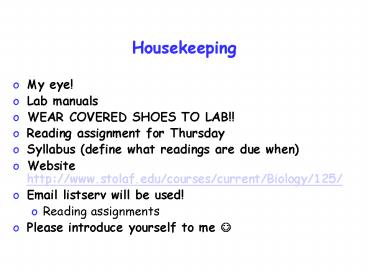Housekeeping PowerPoint PPT Presentation
1 / 48
Title: Housekeeping
1
Housekeeping
- My eye!
- Lab manuals
- WEAR COVERED SHOES TO LAB!!
- Reading assignment for Thursday
- Syllabus (define what readings are due when)
- Website http//www.stolaf.edu/courses/current/Biol
ogy/125/ - Email listserv will be used!
- Reading assignments
- Please introduce yourself to me ?
2
Housekeeping Study Hints
- Go over your notes soon after class
- Rewrite your notes
- Keep a journal
3
Who are we?
4
Who are we?
- We need structure
- We need to reproduce
- We need to grow and develop
- We need energy
- We need to interact with the environment
5
What we will study
- We need structure
- Molecular structure Cell
- We need to reproduce
- Genetics
- We need to grow and develop
- Cell growth/replication
- We need energy
- Cell metabolism
- We need to interact with the environment
- Cell sensing/membrane interactions
- Regulation
6
What are we composed of?
7
What are we composed of?We have structure
8
What are we composed of?
Atoms
Compounds
Macromolecules
Cell
Nucleus DNA Ribosomes Endomembrane Organelles
Elements Covalent bonds
Proteins Lipids Carbohydrates Nucleic acid
Carbon compounds Functional groups
9
What is water made of?
10
Helium What is this atom composed of?
What is Heliums atomic number and weight?
11
How many protons are in Oxygen?How many neutrons?
16
O
8
What if oxygen had more neutrons?
12
What about the electrons?
13
What about the electrons?
14
Electron shells energy levels Electron orbitals
electron path, orbitals are within shells Valence
electrons electrons in the outermost shell
(most energy)
15
Draw an electron shell diagram of these neutral
elements?
O
N
Cl
C
8
7
17
6
16
Definitions
- Element atom with property (defined by protons)
- Subatomic molecules neutrons, protons, electrons
- Electon orbitals electron path
- Electron shells electron energy
- Valence electrons electrons in outermost shell
(most energy)
17
The major elements in us
Hydrogen, Oxygen, Nitrogen, Carbon!
9.5
65
3.3
18.5
18
Why are electrons interesting in biology?
Molecules
How they interact together
Electrons determine an elements chemical behavior
19
Chemical reactionCombination of two or more
elements
- Covalent bonds
- Ionic bonds
- Weak bonds
- Hydrogen bonds
- Van der Waals interactions
The type of bond attributes to its properties and
its structure
20
Covalent bond Molecule
SHARE ELECTRONS
21
Covalent bond
- Nonpolar covalent bond Equally share electrons
- Polar covalent bond Dont share equally
ELECTRONEGATIVITY
22
Ionic bonds
TRANSFER OF ELECTRONS
23
Molecules interact with each other Weak chemical
reactionsWhy?
24
(No Transcript)
25
Hydrogen bonds
What are they?
Purpose in life?
26
The structure of water
27
Van der Waals Reactions
What are they?
Purpose in life?
28
Why is the study of atoms/elements and chemical
reactions important for life?
29
We need structure
Tissue
Cell
Structure gives us function!
Organ
Organelle
Molecule
Organism
30
When two ore more elements are rearranged, energy
shifts!
METABOLISM
http//www.people.virginia.edu/rjh9u/krebs.html
31
Female silkworm moths attract males by emitting
chemical signals through the air. A male can
detect the signal 100 meters away with the use of
its antennae. These antennae has receptor cells
that are able to detect the sex attractant.
Propose a hypothesis to account for the ability
of the male moth to detect a specific molecule in
the presence of many other molecules in the
air??How might you design an experiment?
32
Your text states that the percentage of naturally
occurring elements making up the human body are
similar for other organisms.(What are the four
most common?) How could you account for this
similarity? You have recently received funding
to look for potential life on Mars. Using your
chemistry knowledge, how might you verify that
there is/was life on Mars?
33
You are teaching a high school class about the
basics of agriculture. You mention that many
farmers use crop rotation to maintain a good
quality of soil. An interested student asks
why??How might you explain how chemistry
affects crop yield and the benefits of crop
rotation?
34
BREAK!
35
Why is carbon so important?
- LOTS OF IT!
- Organic chemistry
- CREATES DIVERSITY
HOW?
36
Whats in the valence/outermost shell?
37
Who carbon interacts withHow carbon interacts
CREATE CARBON SKELETONS
38
Who carbon interacts withHow carbon
interactsCARBON SKELETONS
- LENGTH
- BRANCHING
- DOUBLE BONDS
- RINGS
CREATES DIVERSITY
39
(No Transcript)
40
What are hydrocarbons?
- Carbon and hydrogen
- Nonpolar
- Fats and Fuel
CREATES DIVERSITY
41
Diamond
Graphite
42
Who carbon interacts withHow carbon
interactsCARBON SKELETONS
- LENGTH
- BRANCHING
- DOUBLE BONDS
- RINGS
CREATES DIVERSITY
43
What if it has the same molecular formula?
Variation in structure
STRUCTURAL ISOMER
Variation in geometry
GEOMETRIC ISOMER
Spatial variation
ENANTIOMER
44
Spatial variation
Enantiomers
45
DIVERSITY
- WHO interacts
- HOW they interact
- SPATIAL arrangement
- Anything else??
- Functional groups
46
Functional groups
- Hydroxyl group -OH, alcohols
- Carbonyl group CO, ketones or aldehydes
- Carboxyl group -COOH, carboxylic acids
- Amino group -NH2, amines
47
CARBON
- Carbon is a building block
- Creates diversity
- Who
- How
- Spatial arrangement
- Functional groups
48
What are we composed of?We have structure
How do elements come together to form structure?

